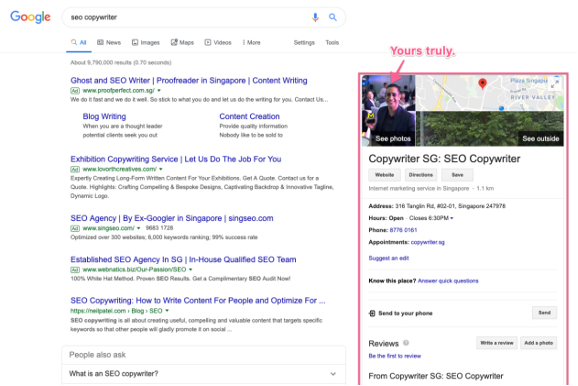I’ve been a search engine optimisation enthusiast for a while now. When I first started trying to figure things out, I was messing around with search engines like AltaVista, Lycos, Excite, and of course everyone’s favourite at that time: ‘you-could-have-bought-Google’, Yahoo!
Back then I never thought SEO would become an industry in itself. It was just too easy. Often all it took was including your keyword in the title and having it littered around your article; and you’d find yourself on the Search Engine Results Page (SERP) 1. Of course, once people started figuring this out, we began seeing all kinds of ‘SEO hacks’ like keyword stuffing, which made articles unreadable, and even comical tactics like keyword masking (ie. publishing keywords on a webpage in the same colour as the background, making them invisible to the reader, but visible to search engines) – which would have been laughable if it didn’t actually work.
At the start of the new millennium, the wild wild west of the world wide web clearly needed to be tamed – and the search engine world was just waiting for the right cowboy to come to town.
OK Google
Google’s origins can be traced back to 1996, when co-founders Larry Page and Sergey Brin developed a search engine called Backrub. What they did different from other search engines at the time was create a better piece of software, commonly referred to as a ‘crawler’, that analysed links between websites to help determine their importance. Think of this like an extended family tree, that included all your friends and acquaintances. If you could be linked to someone important, then by virtue of association, you too must be somewhat important. How close that link is, and the context of that link would also play a part.
Backlinks are still a big part of how Google determines where your website ranks today. Why is this important? Because if your website is just ‘being born into existence’, it’s going to take quite some time (and money) to catch up with those who’ve been around for a while. SEO, thus can become an impossibly arduous and expensive journey for most websites.
Googling Myself
I’ve had some history with the big G. In 2010 I built Singapore’s first motor insurance aggregator website that fetched car insurance prices in real time from (almost) every insurer. With a little over 1,300 car owners renewing their car insurance policies every single day, I put on my SEO hat and ranked the site on the top spot for the keywords “car insurance”. The website turned an operational profit within 6 weeks, and the business was acquired 8 months later. But Google has changed considerably since then.
Over the years I’ve run an umpteen number of SEO experiments with several websites that I own, and one of the most important things I’ve learnt is that there’s usually a smarter way to acquire organic traffic than by just focusing on ranking your site on the top spot for a high volume keyword. When I wanted to rank for the keywords “seo copywriter” for example, I found myself going up against Neil Patel (ie. the Beyonce of the SEO world). There was no way I was going to outrank him without massive amounts of investment in both time and money – so instead, I focused on finding a way to boost my visibility on the SERP instead.

Tadaa!
Dancing To The Tune Of The Algorithm
While it may seem unlikely now, there could come a day when we will all no longer “Google it”. Alternatively, there could also come a time where that’s ALL we need to do. If your business or website operates in an industry that Google has decided to venture into, then you probably already know what that means. Try Googling “online stopwatch’ and then ask yourself how much traffic the top-ranking websites on that SERP receive. Websites in the hotels, flights, and lyrics space are gearing up for the same inevitable fate.
Jessica Bowman, Search Engine Land’s editor at large observed that Google is becoming less search engine and more portal. That’s a big shift; but it comes as no surprise. Google makes over $100b in advertising revenue a year, and none of that comes from organic search. To keep that number growing, Google will have to increase its ‘pay to play’ functions – something a portal stands a better chance at facilitating than a seemingly neutral ‘directory of search results’.
Google made a big move with its June 2019 Core Update, causing many (far more than usual) to lose substantial amounts of organic search traffic. So much so that one online news publication made a very public and impassioned plea for webmasters to take a stand against Google’s autocratic rule over online search – before announcing that the most recent update cost them their business.
While it may have just been a publicity stunt (CCN didn’t close down the site), the June 2019 Core Update and its underlying implications seemed to hit many within the SEO community hard – forcing ourselves to ask: how did we end up putting all our eggs in one casket basket?
Hero To Zero-Click
While it may not be entirely apparent at first, fact is Google isn’t the best original source of traffic for my websites’ conversions – and I bet it isn’t for yours either. Not surprising when you think about it, especially with the rise of zero-click searches: almost half of all searches that happen on Google end up not clicking on any search results at all.
Combined, the top 100 sites by search traffic in the US alone pull in almost 9 billion visits per month. That’s a lot of traffic you’re ignoring by focusing your organic traffic acquisition strategy on Google alone – which by the way, ranks #14 on that list.
Over the years I’ve made it a habit of reaching out directly to my customers to understand the true journey that brought them to my web property, and interestingly enough at least 6 out of 10 times, I hear this: “I chanced upon your name on this other website and Googled you”.
That’s pretty much ‘word-of-internet-mouth’ (word-of-mouse?).
This got me thinking – what if I stopped worrying about where I rank on a Google search, and start thinking about which websites I should appear on.
Enter Search Visibility Optimisation (SVO)
Sir Isaac Newton once famously said, “If I have seen further it is by standing on the shoulders of giants”. What if you too, could stand on shoulders of SERP giants? Wouldn’t that be far less laborious and time-consuming than trying to turn yourself into a giant? I’m not saying don’t do the latter – of course, that’s a great long-term vision for any business. But long-term, is a long time to wait.
Fact is, whichever industry you’re in there are hundreds, thousands, or perhaps even millions of websites in your space. Some might be competitors, sure, but I’m willing to bet my last dollar that there’s a publication, forum, platform, blog, or even a video out there that’s a ‘giant’ in your respective online world. In SVO, we call these your Publications of Influence: websites that have been around for a while, enjoy great standing with Google, and seemingly pop up every now and then when your customers are searching for keywords that are relevant to your business.
In SVO, what we do is identify the right ones for you, get you in them with the right narrative and objective, optimise it for the right keyword, and watch while you magically appear on the first page of Google.
The beauty of SVO is not just in its simplicity, but also in its effectiveness and speed. Just by shifting our focus towards the medium of delivery instead of the platform, SVO accelerates your journey to acquiring visibility on Google’s SERP-1.
Tired Of Slowed Down SEO Growth? Then SVO Up

SVO boosts your SERP visibility for the keywords that matter, often deemed too difficult to rank for through traditional SEO -- and drives more contextualised and better converting traffic to your website.
If you’re ready to learn more about how SVO can transform your online communications and marketing strategy, let’s talk.